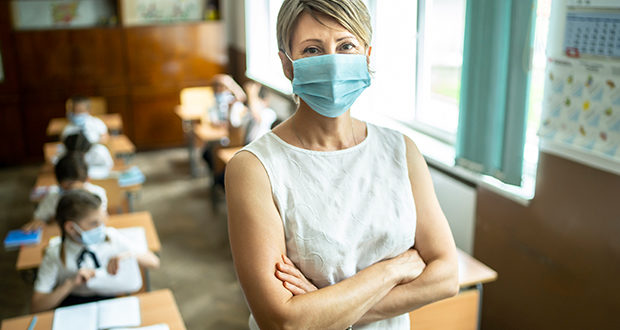More than 90 per cent of Australian teachers saw their stress levels increase during the COVID-19 pandemic, driving educators away from the job.
A recent study carried out in collaboration between La Trobe University and Swinburne University of Technology revealed that increased workload and safety concerns were key elements that caused high levels of stress for teachers during the pandemic.
The survey was conducted nationwide on 532 teachers and principals in June and July 2020.
According to study co-author from Swinburne Kristina Turner, most educators indicated they experienced high stress levels and low levels of positive emotions such a joy or work contentment, which negatively affected their wellbeing.
“This was largely perceived by respondents to be the result of increased pressures in workload, due to the shift to online learning.
“Problematically, our findings also suggest that [the stress experienced] may be driving some teachers to reconsider their continued engagement in the profession,” Turner said.
The survey revealed that 91 per cent of teachers believed their workload had become more demanding during COVID-19 as they had to deal with teaching online and supporting students and their families during the pandemic, which ultimately increased their stress level.
In addition, 41 per cent of teachers indicated feeling angry most of the time in their role, and 47 per cent felt lonely in their daily work life.
COVID-19 safety concerns also contributed to higher stress levels as educators had to navigate between online and face to face learning, and more than 70 per cent of respondents felt unsafe in their teaching environment.
When asked about social distancing, Turner said that 95 per cent of teachers indicated feeling ‘unsafe’ in the classroom, 73 per cent felt ‘unsafe’ in the playground and 60 per cent reported feeling ‘unsafe’ in the staff room.
“Teachers’ safety scores correlated positively with their stress scores as the more unsafe they felt, the more stressed they were,” Turner said.
Educators' stress levels and safety concerns also impacted teacher performance, Turner said, as almost half of the teacher participants reported low feelings of self-efficacy.
About 42 per cent of teachers reported having difficulties in establishing classroom management systems and in getting students to believe they can do well at school under the COVID-19 climate. 50 per cent reported low self-efficacy in managing disruptive behaviour.
While more than 70 per cent of participants believed that teaching is valuable and worthwhile, only 33 per cent reported making progress towards accomplishing their career goals.
“It is important that we understand how teachers were feeling during that time to better inform policy and practice designed to support teacher wellbeing moving forward.
“Reducing teacher stress and improving teacher wellbeing is currently an urgent priority for Australian education systems,” Turner said.
Do you have an idea for a story?Email [email protected]
 Education Review The latest in education news
Education Review The latest in education news

Since returning to the classroom it has become even harder to stimulate learning, students either consciously or subconsciously, are resistant to doing homework, and reluctant to answer questions in the classroom. In fact, the easiest way to quieten a classroom is to ask a question of the whole class, it is instant silence.
I am also coming across gaps in their learning, sometimes in unexpected areas, they may have covered it online, but none of it has stuck.
Pressure at school is unrelenting, we are expected to have a Google classroom entry for every lesson we teach and yet the first thing a student asks when they return to the classroom after being away is “what did we do?”
Setting assessment tasks and then having to reschedule because of absentees, it is constant and draining. Rather than have some consideration of these events and reducing meetings, they have increased.
I would go on but am getting depressed just writing this and I have multiple assessments to plan and correct.
How is everyone else traveling, I have taught for 30+ years and feel incredibly drained!